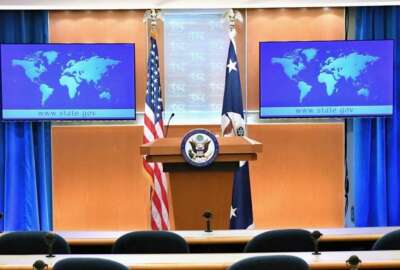
Two agencies are teaming up in the name of environmental justice
In today's Federal Newscast, the Justice Department and the Environmental Protection Agency are teaming up to launch a new environmental justice strategy.
To listen to the Federal Newscast on your phone or mobile device, subscribe in PodcastOne or Apple Podcasts. The best listening experience on desktop can be found using Chrome, Firefox or Safari.
- The Government Accountability Office testified that the Labor Department has not consistently shared key information with contracting agencies. GAO says the inconsistencies increase the risk of excluded contractors slipping through the cracks. During a six-year investigation, Labor uncovered violations of the Service Contract Act leading to $220 million in back wages for workers. The agency determined 60 contractors should be excluded from new federal contracts for three years. The “SCA” provides pay and benefit standards for federally contracted service workers.
- The number of complaints about the CIO-SP4 procurement from NIH is, once again, on the rise. The protest counter for the CIO-SP4 governmentwide acquisition contract is now up to 28. Earlier this week, Precise Federal Consulting filed the latest protest of the solicitation for this $50 billion IT services vehicle. Their complaint comes just about a week after GAO dismissed two others after the NIH IT Acquisition Assessment Center or NITACC took corrective action to fix concerns around the evaluation approach. Precise Federal Consulting is protesting NITAAC’s changes to the RFP because they say the changes introduce new uncertainty to how the agency will evaluate bidders. GAO has until Aug. 10 to decide.
- Agencies have a new guide for securing their technology supply chain. The National Institute of Standards and Technology released the latest update to its Cybersecurity Supply Chain Risk Management guidance. It says organizations should consider vulnerabilities in components, not just the finished product. NIST says risks in the global technology supply chain include malicious software, ransomware attacks and data breaches. The agency is also working on several other publications related to last year’s cybersecurity executive order.
- A new law seeks to get a handle on what constitutes a cyber crime. The Department of Justice will work with the National Academy of Sciences to develop a taxonomy of cyber crime under a new law signed by President Joe Biden this week. The Better Cybercrimes Metrics Act also requires the Attorney General to establish a cyber crime category in the FBI’s National Incident-Based Reporting System. Lawmakers say improved data on cyber crimes will help law enforcement identify trends and better address digital misconduct. The new law also requires the Cybersecurity and Infrastructure Security Agency to be involved in developing better definitions for cyber crimes.
- The Justice Department and the Environmental Protection Agency are teaming up to launch a new environmental justice strategy. Attorney General Merrick Garland announced an enforcement strategy and launched the new Office of Environmental Justice. The agency named environmental attorney Cynthia Ferguson as the office’s acting director. DOJ also collaborated with EPA on the initiative to ensure the agency is using all available legal tools to promote environmental justice. EPA Administrator Michael Regan says the partnership between the two agencies has never been stronger.
- The departments of Treasury and State and the Alliance for Innovative Regulation are combining forces to figure out how to use technology to stop global corruption. The three organizations are launching the first ever tech sprint, called the Anti-Corruption Solutions through Emerging Technologies or A-SET. The effort will bring together experts in government, law enforcement, civil society, financial institutions, financial technology, academia and the private sector to explore practical ideas for how to apply technology to combat corruption. Applications to participate in the tech sprint are due by June 3. The tech sprint will happen over three days starting on June 21, culminating with a demo day on June 24.
- The Education Department is changing its hiring practices for IT professionals. In addition to the typical structured question and answer interview, the department is adding a practical test. Steven Hernandez, the department’s chief information security officer, says that this test is like an MBA level business case. Hernandez says this new hiring practice has already identified strong candidates who were only in the middle of the pack during the first round of interview questions but excelled in the practical component.
- A central office meant to coordinate how the departments of Defense and Veterans Affairs work together on a share Electronic Health Record doesn’t yet have a plan to make sure the system will be interoperable between both agencies. That’s according to a joint audit conducted by the inspectors general for DoD and VA. Their report finds the Federal Electronic Health Record Modernization (FEHRM) Program Office has not taken an active role managing the EHR rollout. Instead the IGs found the office has limited its role to holding talks between VA and DoD when disputes arise. (Federal News Network)
- The Postal Service expects mail prices will need keep going up for the agency to recover. Postmaster General Louis DeJoy expects the Postal Service will need to keep raising prices on its monopoly mail products for the foreseeable future, as part of a 10-year reform plan to improve its long-term financial health. “The mailing industry needs to be prepared for continued use of our authority to raise prices or market dominant product products at an uncomfortable rate.” DeJoy said USPS is also within “striking distance” of achieving its 95% on-time delivery goal for market-dominant mail. On average, it currently takes USPS about 2.7 days to deliver market-dominant mail. (Federal News Network)
- One of the nation’s largest defense contractors is moving its global headquarters from Chicago to the Arlington, Virginia. Boeing says it’s making the move to be closer to government customers and stakeholders. Along with the move, Boeing is creating a new research and technology hub. That organization will focus on developing innovations in cybersecurity, autonomous operations and quantum sciences.
- The Navy is investigating a rash of deaths from sailors stationed on the aircraft carrier USS George Washington. In the last year, seven sailors working on the USS George Washington passed away. Four of those deaths are apparent suicides, two were health-related and one is undetermined. The Navy is moving more than 200 sailors off of the ship and into housing on land. The service started an investigation into the deaths and into the mental health of the sailors in late April. A 13-person mental health team has also been assigned to the ship.
- The State Department is giving out a first of its kind award to employees using data analytics to improve diplomacy. The agency’s Enterprise Data Council is giving its Data for Diplomacy Award out to five winners and making 15 honorable mentions. The agency plans to give more awards out every spring to recognize progress made under its enterprise data strategy. Some of the winning projects helped the agency analyze data related to COVID-19, abnormal health incidents better known as Havana Syndrome, and track the travel of tens of thousands of refugees.
Copyright © 2025 Federal News Network. All rights reserved. This website is not intended for users located within the European Economic Area.
Eric White
Eric White is news anchor and Federal Drive producer at Federal News Network.
Follow @FEDERALNEWSCAST





